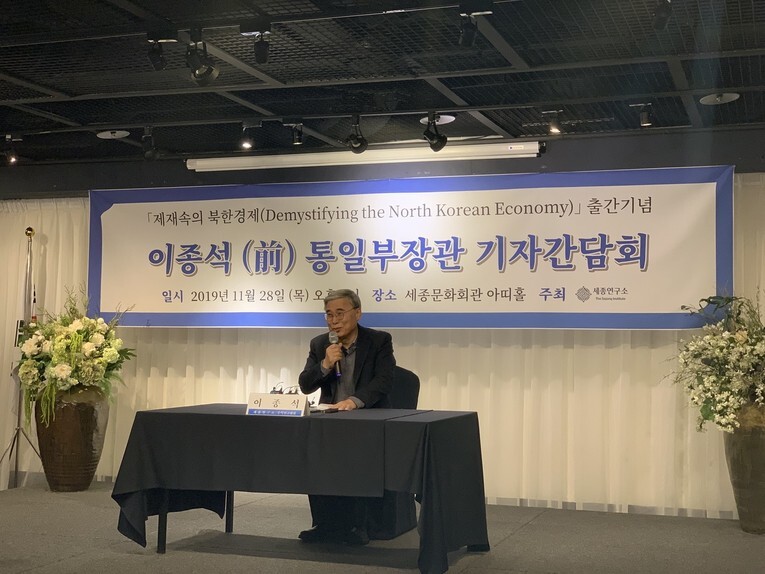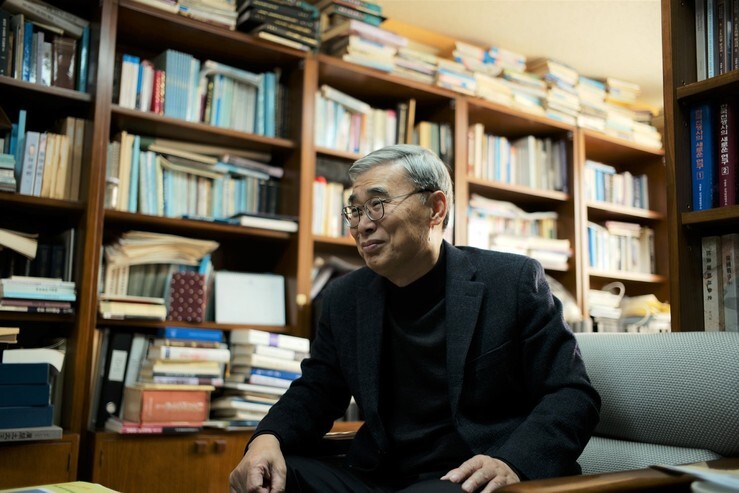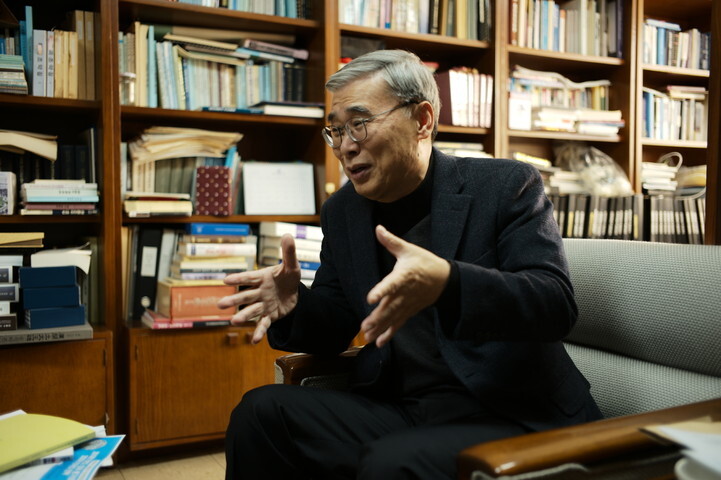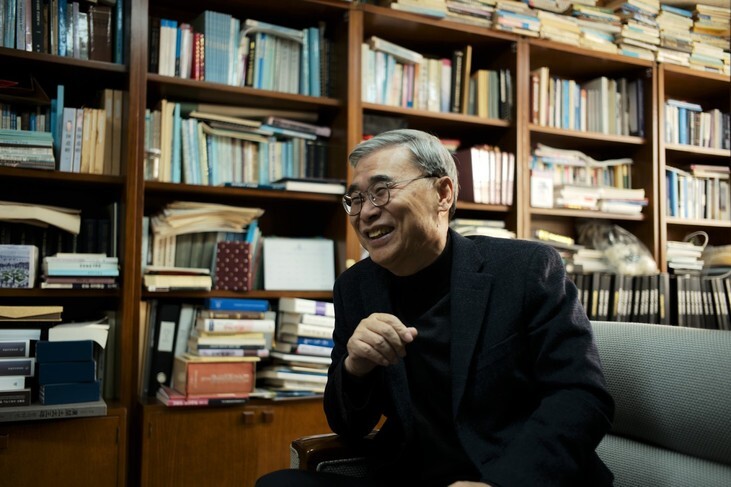hankyoreh
Links to other country sites 다른 나라 사이트 링크
[Interview] Former unification minister speaks on N. Korea’s current transformative changes

A former South Korean unification minister has predicted foundational changes in North Korean society.
“Right now, North Korea is undergoing the most sweeping structural change in its 70-year history. At the center of that change is the North Korean regime, which is to say Kim Jong-un,” said Lee Jong-seok, senior analyst with the Sejong Institute and former South Korean unification minister.
“This is the kind of change that could rock the assumptions on which our North Korean policy has been based thus far,” Lee said.
“Kim Jong-un’s efforts to implement policies that are centered on developing North Korea’s productive capacity are moving in a direction consistent with laudable changes that the outside world has long urged North Korea to make,” Lee stressed.
But Lee also expressed worries. “If the US continues to insist on maintaining sanctions because of the prolonged breakdown of the denuclearization talks, that’s likely to erode North Korea’s willingness to open up its economy.”
Next, Lee posed a question of his own. “Is it really desirable for us to erode Kim’s willingness to open up the economy? The fate of the Korean Peninsula hangs in the balance, and we need to give careful thought about how to resolve the UN’s contradictory sanctions,” before the window of opportunity closes.”
As a researcher on North Korean issues, Lee wrote the book “The North Korean Economy Amid Sanctions: Slide to Unlock” (in collaboration with Sejong Institute researcher Choi Eun-ju) with the goal of “showing how North Korea is changing, especially its economy.” Lee focused his research on identifying the true nature of the changes being orchestrated by Kim Jong-un.
With the hope of correcting the attitudes of American government officials, lawmakers, and experts, who are still obsessed with the idea that North Korea is a closed and belligerent military state that rejects change, Lee had an English translation of his book published first, under the title “Demystifying the North Korean Economy,” which he handed out during a recent visit to the US.
Lee held a press conference marking the publication of his book on Nov. 28. That followed a separate interview with the Hankyoreh at his office at the Sejong Institute, in Seongnam, Gyeonggi Province, on Nov. 19.
“Kim’s policy of going ‘all in’ on the economy isn’t ephemeral or tactical, but rather strategic and historic, an action designed to orchestrate a transformation of the state itself. Most likely, Kim won’t abandon that line,” Lee said.

The main evidence that Lee cites to support his argument is the strategic shift from the North’s prior focus on class-based and productive relationships and its songun (“military first”) policy to a “developmental viewpoint focused on productive capacity.” According to Lee, this represents “an attempt to achieve a qualitative transformation.”
“Arguments that would have been denounced as revisionist or counterrevolutionary even a few years ago are now appearing in the Rodong Sinmun on a daily basis,” Lee expounded.
In Lee’s opinion, it’s Kim’s belief - his obsession, in fact – that rapid growth can help North Korea achieve a level of wealth comparable to China. The extent to which that belief, and that obsession, are practical is a separate question, the former unification minister added.
Lee says that Kim, having concluded that developing productive capability is essential for rapid growth, has launched four campaigns toward that end - namely, a shift in the state’s strategic line, reform, opening up, and technological revolution.
The first campaign (the shift in the state’s strategic line) was formalized with the termination of the two-track line comprising the economy and nuclear weapons followed by the adoption of a strategic line focused on building the economy during the 3rd Plenary Session of the 7th Central Committee of the Workers’ Party of Korea (WPK), held on Apr. 20, 2018. These changes were added to the constitution at the 1st Session of the 14th Supreme People’s Assembly on Apr. 11.
“Building the economy is being prioritized over the military in the distribution of the state’s resources, and the economic structure is being improved to make it more suited for economic development. The state focus is shifting from the military to building the economy,” Lee said.
Two major components of the second campaign (that is, reform) are the “responsible management system for social enterprises,” which is supposed to enhance autonomy and competition, and the “field responsibility system,” which enables individual farmers to become the agents of production and distribution. Lee describes the former as an “icon of Korea’s economic reform” and the latter as “evidence that a major change has occurred in its collectivist method of production.”

The third campaign (namely, opening up) was launched through the constitutional amendment in April 2018 as “foreign economic relationships,” a concept that is much broader in meaning than “foreign trade.” Spatially speaking, this effort is expanding across the country, evidenced by the establishment of special economic zones (the Unjong Cutting-Edge Technological Zone and the Kangnam Economic Development Zone) in Pyongyang. Lee added, however, that “because of the tough sanctions, the projects related to opening up that are actually being carried out are mostly tourism and limited labor exports.”
“Kim has been paying particular attention to [the development of] Samjiyon, Wonsan-Kalma, and Yangdok County Hot Springs, all of which are oriented on tourism. Since Wonsan-Kalma and Yangdok aren’t near the border, those projects will by necessity involve internally opening up,” Lee believes, adding that “tourism is an important mechanism for inevitably leading North Korea to open up.”
North Korea is placing a very high priority on the fourth campaign (that is, technological revolution), as indicated by Kim’s declaration that “if we ignore worker talent and technology, our country is doomed.”

Lee says that the first, second, and fourth campaigns have all borne fruit, but the third campaign (opening up) has still failed to gain traction because of sanctions. That’s behind his assessment that “North Korea cannot achieve rapid economic growth, but it has secured enough internal momentum to at least keep its people well-fed and to fuel gradual development.”
Lee concludes his analysis as follows: “The UN’s tough sanctions on North Korea, spearheaded by the US, are causing serious harm to the North Korean economy, but the North Korean regime has become durable enough to resist those sanctions for a long period of time. Unilateral sanctions alone are incapable of forcing North Korea’s capitulation.” His argument’s implication for practical politics is that the only realistic and operable solution is “step-by-step negotiations involving give and take” rather than “sanctions-focused unilateral pressure.”
By Lee Je-hun, senior staff writer, and Noh Ji-won, staff reporter
Please direct comments or questions to [english@hani.co.kr]

Editorial・opinion
![[Column] Season 2 of special prosecutor probe may be coming to Korea soon [Column] Season 2 of special prosecutor probe may be coming to Korea soon](https://flexible.img.hani.co.kr/flexible/normal/500/300/imgdb/original/2024/0426/3317141030699447.jpg) [Column] Season 2 of special prosecutor probe may be coming to Korea soon
[Column] Season 2 of special prosecutor probe may be coming to Korea soon![[Column] Park Geun-hye déjà vu in Yoon Suk-yeol [Column] Park Geun-hye déjà vu in Yoon Suk-yeol](https://flexible.img.hani.co.kr/flexible/normal/500/300/imgdb/original/2024/0424/651713945113788.jpg) [Column] Park Geun-hye déjà vu in Yoon Suk-yeol
[Column] Park Geun-hye déjà vu in Yoon Suk-yeol- [Editorial] New weight of N. Korea’s nuclear threats makes dialogue all the more urgent
- [Guest essay] The real reason Korea’s new right wants to dub Rhee a founding father
- [Column] ‘Choson’: Is it time we start referring to N. Korea in its own terms?
- [Editorial] Japan’s rewriting of history with Korea has gone too far
- [Column] The president’s questionable capacity for dialogue
- [Column] Are chaebol firms just pizza pies for families to divvy up as they please?
- [Column] Has Korea, too, crossed the Rubicon on China?
- [Correspondent’s column] In Japan’s alliance with US, echoes of its past alliances with UK
Most viewed articles
- 1No good, very bad game for Korea puts it out of Olympics for first time since 1988
- 2[Column] Season 2 of special prosecutor probe may be coming to Korea soon
- 3Korea’s 1.3% growth in Q1 signals ‘textbook’ return to growth, says government
- 4‘We must say no’: Seoul defense chief on Korean, USFK involvement in hypothetical Taiwan crisis
- 5Is N. Korea threatening to test nukes in response to possible new US-led sanctions body?
- 6Division commander ordered troops to enter raging flood waters before Marine died, survivor says
- 7[Column] ‘Choson’: Is it time we start referring to N. Korea in its own terms?
- 8Will NewJeans end up collateral damage in internal feud at K-pop juggernaut Hybe?
- 9Korea sees more deaths than births for 52nd consecutive month in February
- 10[Editorial] Korea’s surprise Q1 growth requires objective assessment, not blind fanfare